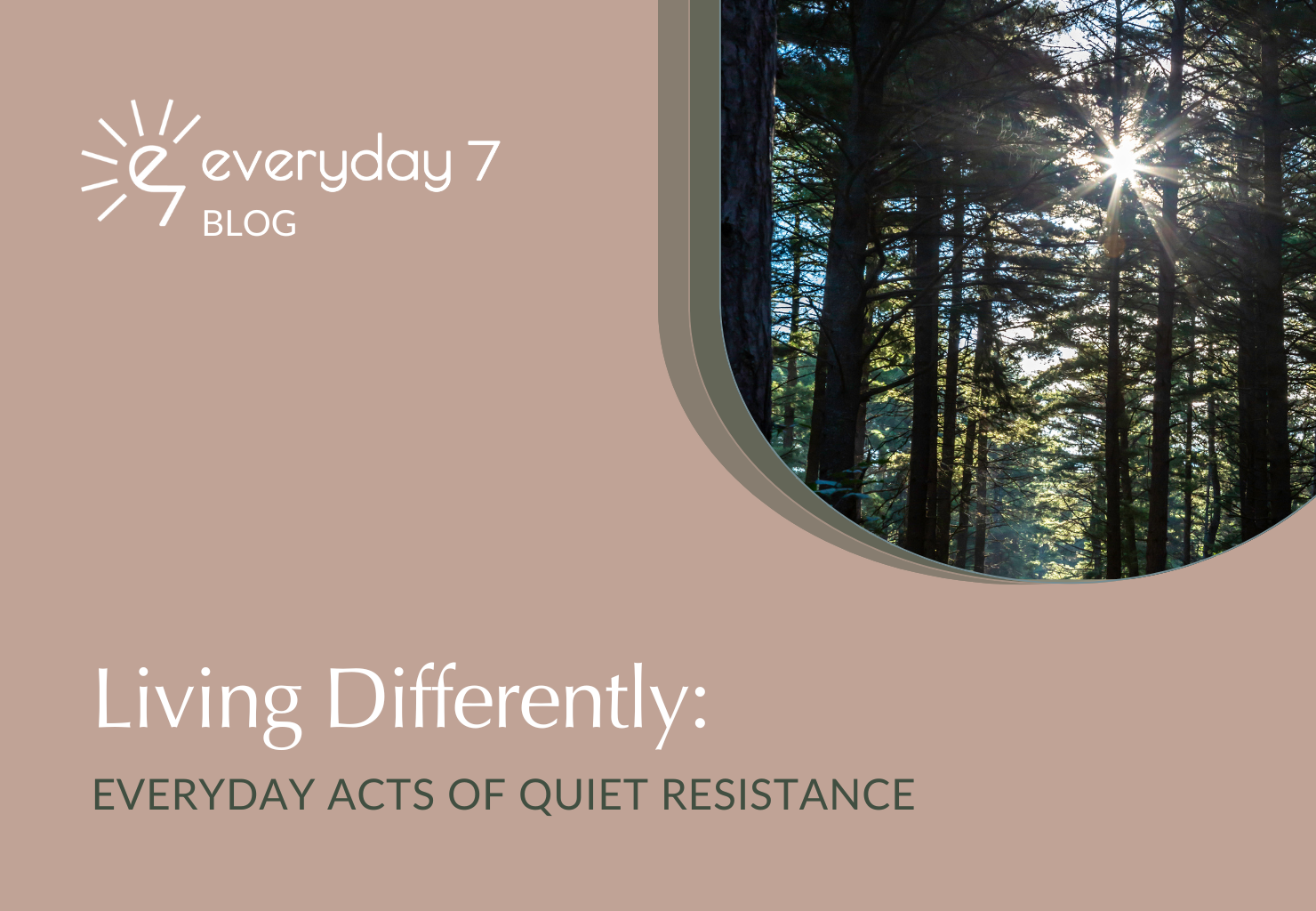Living Differently: Everyday Acts of Quiet Resistance
What if resistance isn’t always loud or visible? This piece explores how aligned, intentional choices—like presence, care, and community—can become everyday forms of resistance. It invites you to reclaim your power through practical, subtle contributions that nourish both self and society.

The Essence of It
Not all resistance is loud. Some of it grows in gardens, gathers in circles, or rests without apology. In a world hungry for transformation, quiet radicalism is one path among many. Everyday 7 is one such space. Your knitting group counts too. So does any third space that centers people, values, and presence. This is about finding the version of resistance that fits your nervous system, your values, and your everyday life.
Core Insights
- Resistance doesn’t always shout. It also listens, tends, and chooses.
- Quiet radicalism invites us to live into our values, not just speak them.
- Building and participating in parallel systems—like E7 or a local group—makes space for human life outside the grind.
- The goal isn’t one right way. The goal is your way.
Not All Resistance Looks the Same
It’s easy to believe the only way to create change is to go big, go public, or go viral. But real transformation happens in all kinds of ways.
Sometimes it looks like refusing to monetize every hour of your day.
Sometimes it looks like making soup and offering it to someone who needs it.
Sometimes it’s a circle, not a protest.
Sometimes it’s silence, not a speech.
Quiet radicalism is about choosing a different pace, a different rhythm, a different logic for living. It’s about not playing the game at all—and still showing up.
What Is Quiet Radicalism?
It’s presence in a world built on performance.
It’s the refusal to hustle for worth.
It’s attention in a culture of urgency.
This kind of radicalism doesn’t always seek to change the world directly. It lives as if the world is already different. It creates pockets of reality where care, agency, and relationship matter more than optics or outcomes.
It’s not passive. It’s deeply rooted.
It’s not loud. It’s deeply felt.
You’ll find it in shared meals, mutual aid, rest, slowness, accountability, art, honest conversation, land stewardship, deep friendships, and radical parenting.
Parallel Systems: Not Escape. Alternative.
Quiet radicalism doesn’t mean walking away from the world. It means living in it differently.
That might look like:
- A collective that runs on consensus instead of hierarchy
- A recovery circle that centers healing, not shame
- A kitchen table where big decisions get made
- A member-led space like Everyday 7, where people bring their whole selves
The point isn’t to find the perfect space. The point is to notice what’s already alive around you—and join it. Or plant something of your own.
Parallel systems are already here. We just need to learn how to see and support them.
Find Your Flavor of Resistance
Some people take to the streets. Others tend to the soil. Some hold space. Some build tools. Some rest, on purpose.
What matters is finding your form of participation. The one that feels honest.
Books like Braiding Sweetgrass remind us that reciprocity is a worldview. Rest Is Resistance reframes exhaustion as a systemic harm, not a personal failure. Emergent Strategy teaches that small is not just beautiful—it’s strategic. How to Do Nothing insists that attention is sacred.
They’re not writing about escape. They’re writing about a different kind of presence.
Everyday 7 Is One Form of This Work
At Everyday 7, we host circles, not stages.
We don’t preach. We practice.
We don’t offer escape or salvation. We offer presence.
We believe in living a human life with other humans. One that is not optimized, but aligned. One that honors truth and trust more than productivity or performance.
Our 7 Principles are not prescriptions. They’re reminders. Ways to return to center and live like it matters.
You don’t have to be loud to matter.
You don’t have to be perfect to participate.
You don’t have to do it all to be part of the shift.
Find what fits. Then live into it.
Ways Quiet Resistance Might Already Be Showing Up in Your Life
- Saying no to one more obligation
- Choosing to repair a relationship instead of avoiding it
- Being generous without documenting it
- Letting joy or stillness interrupt productivity
Further Reading
These thinkers offer grounded ways to reimagine participation, presence, and resistance:
- The More Beautiful World Our Hearts Know Is Possible — Charles Eisenstein
- Emergent Strategy — adrienne maree brown
- Braiding Sweetgrass — Robin Wall Kimmerer
- Quiet — Susan Cain
- How to Do Nothing — Jenny Odell
- Rest Is Resistance — Tricia Hersey (The Nap Ministry)
- Work from Prentis Hemphill and Toko-pa Turner
Essential Practice
Take five minutes to notice the quiet forms of radicalism already alive in your life.
Name one. Nurture it.




